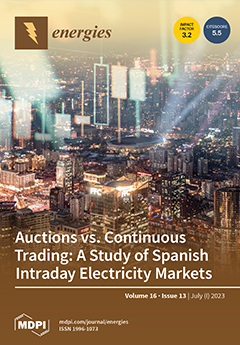Authors: Arenas-Larrañaga Mikel a,b, Santos-Mugica Maider a , Alonso-Ojanguren Laura a , Martin-Escudero Koldobika b
a TECNALIA, Basque Research and Technology Alliance (BRTA), Area Anardi 5, Azpeitia, ES-20730, Spain
b ENEDI Research Group, Department of Energy Engineering, University of the Basque Country (UPV/EHU), Torres Quevedo 1, Bilbao, ES-48013, Spain
Energies, Open Access, Volume 16, Issue 13, July 2023, Article number 5156
Keywords: Dymola, heat pump, Modelica, photovoltaic panels, self-consumption

Impact Factor: 3.2
Abstract: The integration of photovoltaic panels and heat pumps in domestic environments is a topic that has been studied extensively. Due to their electrical nature and the presence of elements that add thermal inertia to the system (water tanks and the building itself), the functioning of compression heat pumps can be manipulated to try to fulfill a certain objective. In this paper, following a rule-based control concept that has been identified in commercial solutions and whose objective is to improve the self-consumption of the system by actively modulating the heat pump compressor, a parametric analysis is presented. By making use of a lab-tested model, the performance of the implemented control algorithm is analyzed. The main objective of this analysis is to identify and quantify the effects of the main parameters in the performance of the system, namely the climate (conditioning both heating and cooling demands), the photovoltaic installation size, the thermal insulation of the building and the control activation criteria. A total of 168 yearly simulations have been carried out. The results show that the average improvement in self-consumption is around 13%, while the cost is reduced by 2.5%. On the other hand, the heat from the heat pump and the power consumed increase by 3.7% and 5.2%, respectively. Finally, a linear equation to estimate the performance of the controller is proposed.